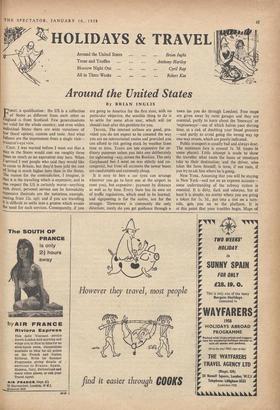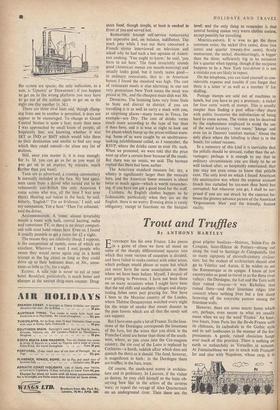HOLIDAYS & TRAVEL
Around the United States ... Brian Inglis Trout and Truffles Anthony Hartley Moscow Night Out Cyril Ray All in Three Weeks ••• ••• Robert Kee
Around the United States
By BRIAN INGLIS IFum', a qualification : the US is a collection of States as different from each other as England is from Scotland. Few generalisations are valid for the whole country; and even within individual States there are wide variations of Law (local option), custom and taste. And what follows are the impressions from a single visit— a tourist's-eye view.
Cost I was warned before I went out that a stay in the States would cost me roughly three times as much as an equivalent stay here. When I arrived I met people who said they would like to come to Britain, but they'd been told the cost Of living is much higher here than in the States. The reason for the contradiction, I imagine, is that it is the travelling which is expensive; and in one respect the US is certainly worse—anything With direct, personal service can be formidably eX )ensive (haircuts are the notorious example, CO sting from 12s. up); and if you are travelling it is difficult to settle into a groove which avoids the need for such services. Consequently, if you
are going to America for the first time, with no particular objective, the sensible thing to do is to settle for some all-in tour, which will (or should) look after this problem for you.
TRAVEL. The internal airlines are good, pro- vided you do not expect to be cosseted the way you are on international routes and provided you can afford to risk getting stuck by weather from time to time. Trains are too expensive for or- dinary purposes unless you take one deliberately for sightseeing—say, across the Rockies. The only Greyhound bus I went on was elderly and un- congenial, but from all accounts the newer buses are comfortable and extremely cheap.
It is easy to hire a car (you can arrange wherever you go to have one at the airport to meet you), but expensive: payment by distance as well as by time. Every State has its own set of traffic regulations, which need to be learned; and signposting is for the native, not for the stranger. 'Downtown' is commonly the only direction; rarely do you get guidance through a
town (as you do through London). Free maps are given away by most garages and they are essential, partly to learn about the 'freeways' or 'expressways'—use of which halves your driving time, at a risk of doubling your blood pressure —and partly to avoid going the wrong way up one-way streets, which are poorly indicated.
Public transport is usually bad and always dear. The minimum fare is around Is. 3d. (more in some places). Little attempt is made to show the traveller what route the buses or streetcars take to their destination; and the driver, who takes the fares himself, is terse, if not rude, if you try to ask him where he is going.
NEW YORK. Assuming that you will be staying in New York—and not on an expense account— some understanding of the• subway system is essential. It is dirty, dark and odorous, but at least it is simple; no matter where you are going a token for Is. 3d., put into a slot on a turn- stile, gets you on to the platform. It is at this point that your troubles begin. Maps of the system are sparse; the only indication, as a rule, is `Uptown' or 'Downtown'; if you happen to get on to the wrong platform you may have to go out of the stition again to get on to the right one (for another 1s. .3d.). There are three rival lines and, though chang- ing from one to another is permitted, it does not appear to be encouraged. To change at Grand Central Station is quite a feat; more than once I Was approached by small knots of people., all hopelessly lost, not knowing whether, it was IRT or IND or BMT which would take them to their destination and unable to find any map which they could consult—let alone any list of stations.
Still, once you master it, it is easy enough; for Is. 3d. you. can go as far as you want (if you get on to an express, by mistake, much farther than you want). Taxis are as advertised; a running commentary Is normally included in the fare. My best speci- men came from a driver who turned out to be vehemently anti-British (the only American I came across who was, all the time I was over there). Heating our voices in the back, he said, bitterly, `English !"I'm an Irishman,' I said; and my companion, 'I'm a Scot.' Then I'm ashamed,' said the driver.
ACCOMMODATION. A `room' almost invariably means a room with bath, central heating, radio and sometimes TV, so there is no direct compari- son with most hotel rooms here. Even so, I found it usually possible to get a room for £2 a night. The reason they are relatively cheap, I suppose, is the competition of motels, some of which are excellent. Wherever I went I met people who swore they would never again stay in a hotel (except in the big cities) so long as they could drive up to their bedroom door, at 30s., some- times as little as 15s., for a night.
EATING. A safe rule is never to eat at your hotel. Breakfast, particularly, is much better and cheaper at the nearest drug-store counter. Drug-
store food, though simple, at least is cooked in front of you and served hot.
Restaurants (except self-service restaurants) are expensive and, on balance, indifferent. The stock joke while I was out there concerned a French visitor interviewed on television and asked why he had such a low opinion of Ameri- can cooking. `You ought to know,' he said, `you have to eat here.' The food invariably sounds good (American menus are mouth-watering) and usually looks good, but it rarely tastes good— in ordinary restaurants, that is : in American homes I found the standard was high. The cost of restaurant meals is also alarming; in one not very pretentious New York menu the steak was priced at 50s., and the cheapest Main dish was 30s.
DRINKING. The licensing laws vary from State to State and district to district; if you are travelling it is as well to carry a stock with you, as surprising places—many towns in Texas, for example—are Dry. The cost of drinks varies much more according to the type of bar than it does here, and it is wise at night to look out for places which bump up the prices without warn- ing. Some of were caught by an unobtrusive- looking establishment called, as I remember, the RSVP, where the drinks came to over 10s. each. When we protested, we were told that the price went up after a certain hour because of the music. But there was no music, we said. The barman replied that there had been, earlier.
The American standard measure for, say, a whisky is significantly larger than the measure here, and the American home measure is about twice as much again—which is worth remember- ing, if you have not got a good head for the stuff.
CLOTHES. As English clothes happen to be fashionable, particularly when they are on the English, there is no worry. Evening dress is rarely obligatory, except at functions on the banquet
level; and the only thing to remember is that central heating makes very warm clothes useless, except possibly for travelling.
MISCELLANEOUS. It is wise to get the three common coins, the nickel (five cents), dime (ten cents) and quarter (twenty-five cents), firmly memorised; the nickel, disconcertingly, is bigger than the dime; sufficiently big to be mistaken for a quarter when tipping, though if the recipient happens to be a New York taxi-driver it is not a mistake you are likely to repeat.
On the telephone, you can land yourself in con- siderable expense and trouble if you forget that there is a letter 'o' as well as a number '0' for dialling.
Postage stamps are sold out of machines in hotels, but you have to pay a premium : a nickel for four cents' worth of stamps. This is usually simpler than finding a post offlce—they share with public lavatories the indistinction of being hard to come across. The visitor can be deceived by the euphemisms employed to avoid the use of the word lavatory : `rest room,' lOunge' and even (as in Denver) `comfort station.' About the only place where the labelling is clear is in the South; for colour reasons.
In a summary of this kind it is inevitable that the pitfalls should be stressed, rather than the ad- vantages; perhaps it is enough to say that in ordinary circumstances you are likely to be so well looked after, so hospitably entertained, that you may not even come to know that pitfalls exist. The only level on which I found American life unattractive was where the expense account (much less curtailed by tax-men than here) has corrupted; but wherever you go, I shall be sur- prised if you are not struck by the contrast be- tween the gloomy advance picture of the American `Organisation Man' and the friendly, human reality.



































 Previous page
Previous page